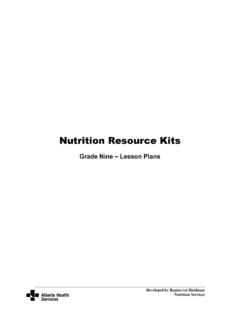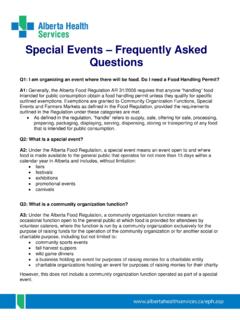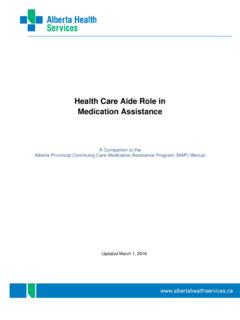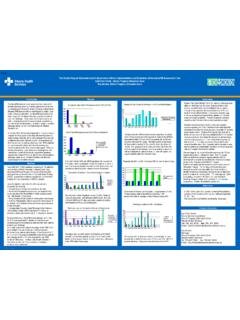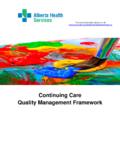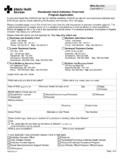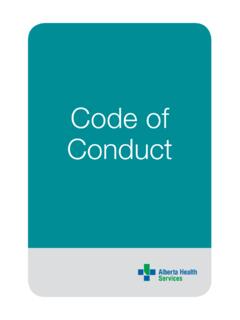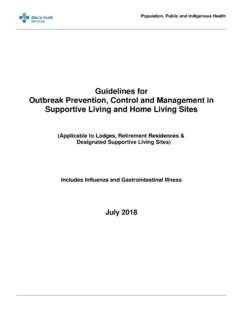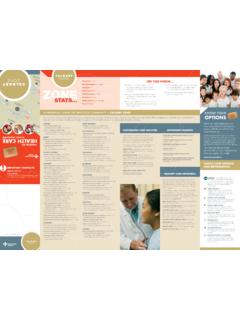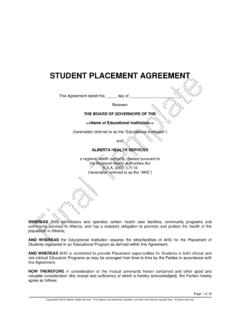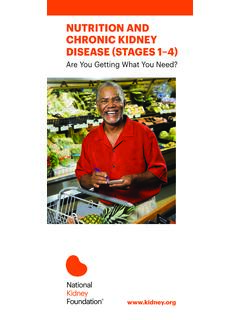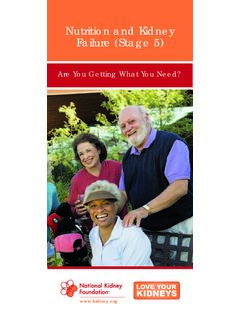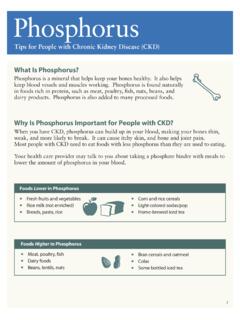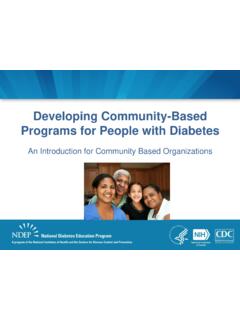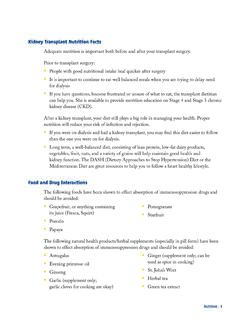Transcription of Nutrition for Chronic Kidney Disease - Alberta Health Services
1 eating Well for Chronic Kidney Disease (CKD) Developed by Registered Dietitians Nutrition Services 404272-NFS Chronic Kidney Disease (CKD) is the presence of Kidney damage, or decreased Kidney function. How can I keep my Kidney function from decreasing? The best ways to help maintain your Kidney function is to manage your blood sugar (if you have diabetes ) and blood pressure. Make healthy living choices, including those below. eating well to maintain Kidney function. o Eat less sodium (salt). o Get enough fluid every day. o Eat the right amount of protein. If you smoke, quit. Be active every day. Take your medicines as suggested by your healthcare team. The information in this handout can help you make healthy living choices for Chronic Kidney Disease . How will my diet change? Everyone s Nutrition needs are different, and might change over time. Your dietitian can help you decide what will work best for you. Sodium (salt) eating too much sodium (salt) makes it harder for your kidneys to get rid of extra water and to control your blood pressure.
2 A high sodium diet can cause swelling and high blood pressure, and make it harder to breathe. eating less sodium can help prevent more damage to your kidneys and help maintain your Kidney function. To decrease the sodium you eat: Cook and eat food without adding salt. Choose fresh or frozen foods, or foods made at home with little or no added salt. Eat less processed, packaged, or restaurant foods. Flavour your food with herbs, spices, garlic, onion, lemon juice, vinegar, and seasoning mixes with no salt added. Limit condiments and sauces (ketchup, mustard, soy sauce, gravies, and salad dressings). Limit pickled foods, olives, chutneys, and dips. Read the Nutrition Facts table on food labels. Choose foods with less sodium. Fluid Your doctor or dietitian will help you decide how much fluid is right for you. Water is the best choice. If extra fluid builds up around your face, arms, legs and ankles, talk to your healthcare team.
3 It may help to limit fluid and decrease the amount of sodium (salt) you eat. eating Well for Chronic Kidney Disease (CKD) Page 2 of 3 404272-NFS Protein Protein is important to build muscle, repair tissue, heal wounds, and fight infections. When you have Kidney Disease , your body may not be able to remove protein waste from your blood. Your dietitian can help you find the right amount of protein to eat every day. Higher protein foods: beef, pork, game chicken or turkey, lean cooked dried beans (navy, black, mung), chickpeas, lentils* cheese* egg fish or seafood milk*, skim, 1%, 2% tofu*, firm soy beverage* yogurt* * If you need to limit the potassium and/or phosphorus in your diet, you might need to limit these foods. Phosphorus When your kidneys are not working well, extra phosphorus can build up in your blood. High phosphorus levels can affect your bone Health and heart Health . eating less phosphorus (phosphate) from food can help lower your blood phosphorus levels.
4 Ask your dietitian for more information about your phosphorus levels and about how much phosphorus is right for you. Phosphate additives: Some packaged foods have phosphate additives. Your body absorbs phosphorus from additives more easily than phosphorus that is naturally in food. You can start by reading ingredient lists on food packages. Limit foods that list phosphate additives. Phosphorus binders: You may also be asked to take phosphorus binders. These are pills that act like a sponge. They soak up phosphorus from your food and stop it from being absorbed into your blood. You take phosphorus binders with food. Ask your doctor or dietitian for more information. Potassium As your Kidney function decreases, the amount of potassium in your blood may be too high or too low. This can affect your heart Health . Ask your doctor or dietitian about your potassium levels and about how much potassium is right for you. They may suggest reducing the amount of high potassium foods in your diet.
5 Or, you may need to eat more high potassium foods. Your dietitian can give you more information about how to get the right amount of potassium from food. Potassium additives: If you are limiting high potassium foods, you can start by reading ingredient lists on food packages. Limit foods that list potassium additives. Supplements: vitamins, minerals, herbal, and natural Before taking any vitamin, mineral, herbal, or natural supplements, talk with your dietitian, pharmacist, or doctor. Some supplements may be harmful for people with reduced Kidney function. Your healthcare team can talk to you about whether supplements are right for you. Weight and CKD People with Kidney Disease may lose too much weight, or may carry extra weight. If you have questions about your weight, talk to your dietitian. eating Well for Chronic Kidney Disease (CKD) Page 3 of 3 404272-NFS (May 2021) 2021 Alberta Health Services , Nutrition Services This material is intended for general information only and is provided on an "as is", "where is" basis.
6 Although reasonable efforts were made to confirm the accuracy of the information, Alberta Health Services does not make any representation or warranty, express, implied or statutory, as to the accuracy, reliability, completeness, applicability or fitness for a particular purpose of such information. This material is not a substitute for the advice of a qualified Health professional. Alberta Health Services expressly disclaims all liability for the use of these materials, and for any claims, actions, demands or suits arising from such use. If you don t feel like eating Some people with Kidney failure have a low appetite because they feel sick or have a bad taste in their mouth. eating less might make you feel weak, and you may lose muscle. Try the tips below when you don t feel like eating : Try to keep eating through the day. Try eating small meals every 2 3 hours instead of 3 big meals. Choose cold or room temperature foods and drinks.
7 The smell from hot foods may bother you. Add extra healthy fats such as olive or canola oil to your food. Try a Nutrition supplement drink. Ask your dietitian about a product that s right for you. Talk to your dietitian if you re not sure of what to eat when you are feeling sick. If you have diabetes Managing your blood sugar will help keep your kidneys working as well as possible. Eat 3 meals each day. Have snacks if meals are far apart or if they help you eat smaller portions at your meals. Test and record your blood sugar often. Work with your doctor or healthcare team to decide: o the kind and amount of insulin or diabetes medicine that s best for you. o the best time of day to take insulin and medicines. Meal planning It may take some time to get used to healthy eating choices for your Kidney Disease . Ask your dietitian for ideas about: grocery shopping planning meals changing your favourite recipes to be more Kidney -friendly Your dietitian can give you other sources of Nutrition information.
8 My goals This handout includes lifestyle choices that can help you manage your Chronic Kidney Disease . Change can be hard, especially if we try to make too many changes at once. When you re ready to make a change, it can help to set a goal, and break your goals into small steps. You re more likely to achieve smaller goals. Ask your healthcare team if you would like support with goal setting. If you re ready to set a goal, you can write it in the space below. My goal.
